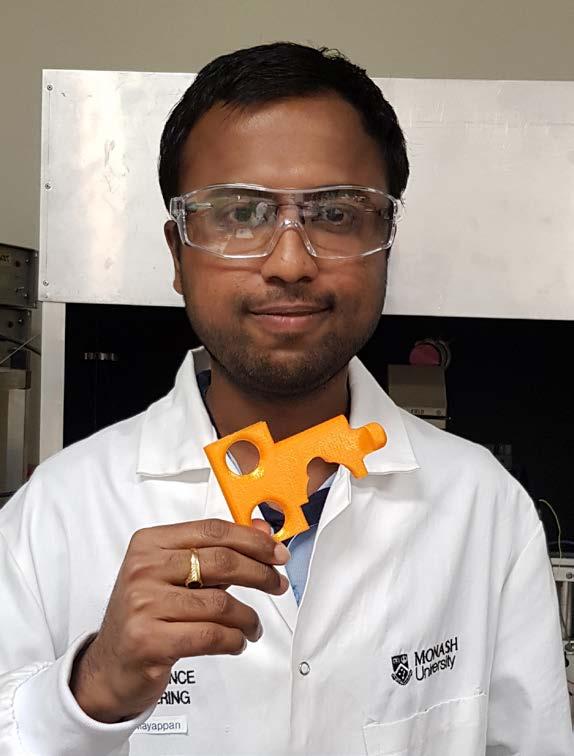
3 minute read
INDUSTRY NEWS: Monash Student Develops 3D Printed Key to Prevent COVID-19 Spread
Source: Sally Wood
A Monash University engineering student has used 3D printing to develop a cheap and safe plastic tool that can open doors and push buttons, eliminating the need for hand contact on potentially contaminated surfaces in the era of COVID-19.
PhD student, Muthu Vellayappan from Monash University’s Department of Materials Science and Engineering, is the person responsible for inventing the simple tool that can help people eliminate their direct contact with door handles, lift buttons, ATM digits, toilet flushers and hand dryers, and other areas where contamination might be present. These kinds of tools are essential when it comes to limiting the spread of COVID-19. After watching videos online of people sneezing and spitting into their hands, and deliberately touching door handles and .lift buttons, Vellayappan jumped into the lab, in early March 2020, to design and test the tool he calls a ‘Safety Key’. The ‘Safety Key’ helps to slow the transmission of viruses in the community. Under the guidance of Professor Neil Cameron, Head of the Department of Materials Science and Engineering at Monash University, Vellayappan made 30 prototypes of the key, which he circulated to Monash staff, and a further 10 copies to a neighbouring hospital. Vellayappan said the key is multifunctional and can work on L-shaped and U-shaped door handles which are commonly found at shopping centres, hospitals and universities, and in places of high pedestrian traffic, such as traffic stops, tram and bus buttons, ATMs, and lifts. He is also looking at further modifications to the key so that it can be used on the handles of supermarket trolleys. Above all, the cost to produce one of the keys, using 3D printing, is less than $1, including materials and manufacturing. With industry support or additional funding, this cost could be reduced if the design is injection moulded for mass production. Additionally, while it currently takes between 60 and 90 minutes to create a single key, this timeframe could be significantly reduced if the key is produced en-masse. While the main motivation to create the key was to stop the community transmission of COVID-19, Vellayappan says the key can also prevent other viruses and bacteria spreading from surface-to-person in areas of high public frequency. “The first design was extremely bulky and had only one groove, which wasn’t sufficient for the different sizes of L-shaped door handles we have in our community,” Vellayappan said. “With a size less than that of a mobile phone, I was able to adjust the key to fit a number of door handles across the University, allowing me to open and close each door without making contact with the handle,” Vellayappan continued. “Usually, we are prone to infection in a common area, like shopping centres and public bathrooms, where L-shaped door handles are common. Cleaning the keys is also very simple – because they’re made from plastic, a gentle wash in warm water with soap will do the job,” Vellayappan explained. Vellayappan isn’t seeking a patent for his product, and has willingly shared his design with people across the world who have access to 3D printers. “It’s important now for people across the world to have immediate access to tools that can help slow the spread of this virus. People’s lives depend on any little innovation – especially one such as the ‘Safety Key’ which is cost-effective and easy to produce,” Muthu said. Professor Cameron commended Muthu’s innovation: “This is a great example of how resourceful and creative our PhD students are. I hope that Muthu’s ‘Safety Key’ is adopted widely and helps reduce community spread of COVID-19.”

PhD student, Muthu Vellayappan, has invented a ‘Safety Key’ that can help people eliminate contact with potentially contaminated surfaces in the era of COVID-19.










